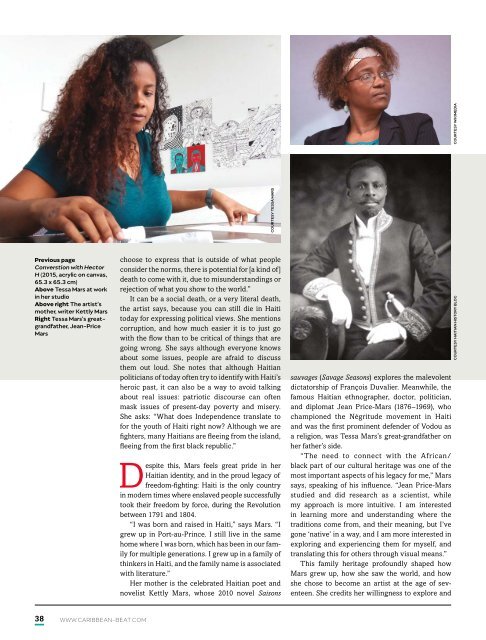Caribbean Beat — May/June 2018 (#151)
A calendar of events; music, film, and book reviews; travel features; people profiles, and much more.
A calendar of events; music, film, and book reviews; travel features; people profiles, and much more.
Create successful ePaper yourself
Turn your PDF publications into a flip-book with our unique Google optimized e-Paper software.
Previous page<br />
Converstion with Hector<br />
H (2015, acrylic on canvas,<br />
65.3 x 65.3 cm)<br />
Above Tessa Mars at work<br />
in her studio<br />
Above right The artist’s<br />
mother, writer Kettly Mars<br />
Right Tessa Mars’s greatgrandfather,<br />
Jean-Price<br />
Mars<br />
choose to express that is outside of what people<br />
consider the norms, there is potential for [a kind of]<br />
death to come with it, due to misunderstandings or<br />
rejection of what you show to the world.”<br />
It can be a social death, or a very literal death,<br />
the artist says, because you can still die in Haiti<br />
today for expressing political views. She mentions<br />
corruption, and how much easier it is to just go<br />
with the flow than to be critical of things that are<br />
going wrong. She says although everyone knows<br />
about some issues, people are afraid to discuss<br />
them out loud. She notes that although Haitian<br />
politicians of today often try to identify with Haiti’s<br />
heroic past, it can also be a way to avoid talking<br />
about real issues: patriotic discourse can often<br />
mask issues of present-day poverty and misery.<br />
She asks: “What does Independence translate to<br />
for the youth of Haiti right now? Although we are<br />
fighters, many Haitians are fleeing from the island,<br />
fleeing from the first black republic.”<br />
Despite this, Mars feels great pride in her<br />
Haitian identity, and in the proud legacy of<br />
freedom-fighting: Haiti is the only country<br />
in modern times where enslaved people successfully<br />
took their freedom by force, during the Revolution<br />
between 1791 and 1804.<br />
“I was born and raised in Haiti,” says Mars. “I<br />
grew up in Port-au-Prince. I still live in the same<br />
home where I was born, which has been in our family<br />
for multiple generations. I grew up in a family of<br />
thinkers in Haiti, and the family name is associated<br />
with literature.”<br />
Her mother is the celebrated Haitian poet and<br />
novelist Kettly Mars, whose 2010 novel Saisons<br />
Courtesy Tessa Mars<br />
sauvages (Savage Seasons) explores the malevolent<br />
dictatorship of François Duvalier. Meanwhile, the<br />
famous Haitian ethnographer, doctor, politician,<br />
and diplomat Jean Price-Mars (1876–1969), who<br />
championed the Négritude movement in Haiti<br />
and was the first prominent defender of Vodou as<br />
a religion, was Tessa Mars’s great-grandfather on<br />
her father’s side.<br />
“The need to connect with the African/<br />
black part of our cultural heritage was one of the<br />
most important aspects of his legacy for me,” Mars<br />
says, speaking of his influence. “Jean Price-Mars<br />
studied and did research as a scientist, while<br />
my approach is more intuitive. I am interested<br />
in learning more and understanding where the<br />
traditions come from, and their meaning, but I’ve<br />
gone ‘native’ in a way, and I am more interested in<br />
exploring and experiencing them for myself, and<br />
translating this for others through visual means.”<br />
This family heritage profoundly shaped how<br />
Mars grew up, how she saw the world, and how<br />
she chose to become an artist at the age of seventeen.<br />
She credits her willingness to explore and<br />
courtesy haitian history blog courtesy wikimedia<br />
38 WWW.CARIBBEAN-BEAT.COM


















